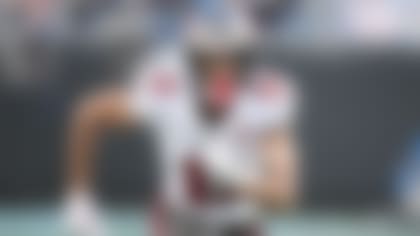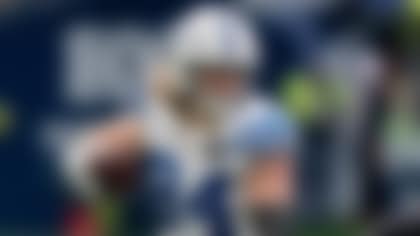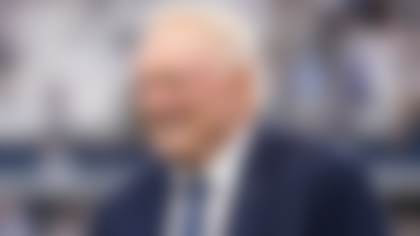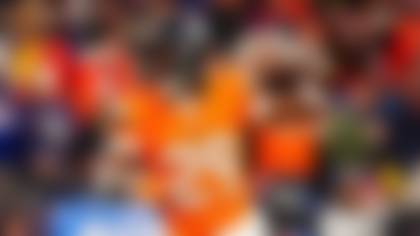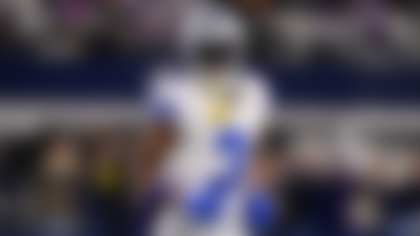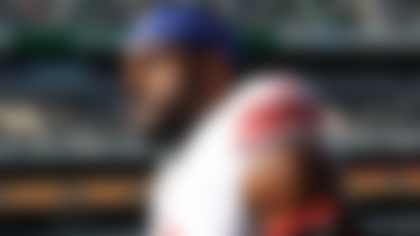This month's draft offers the deepest pool of potential franchise quarterbacks we've seen all century. With a possible four passers set to be taken with the first five picks, Marc Sessler has updated his rankings of each QB class since the turn of the millennium. A hefty portion of the rankings has changed thanks to what transpired since last year's version of this list -- but much has stayed the same.
NOTE: Pro Bowlers are denoted by bold/italics.
18) 2007
Round 1: JaMarcus Russell (No. 1 overall), Brady Quinn (No. 22)
Round 2: Kevin Kolb (No. 36), John Beck (No. 40), Drew Stanton (No. 43)
Round 3: Trent Edwards (No. 92)
Round 4: Isaiah Stanback (No. 103)
Round 5: Jeff Rowe (No. 151), Troy Smith (No. 174)
Round 6: Jordan Palmer (No. 205)
Round 7: Tyler Thigpen (No. 217)
Undrafted:Matt Moore
We begin our journey in grim territory. The 2007 NFL Draft was "headlined" by JaMarcus Russell, arguably the most severe quarterback bust of all time and a first-overall whiff who set the Raiders back years. The 6-foot-6, 265-pound LSU star produced a grotesque 7-18 mark as a starter and finished 2009 -- his final year in the league -- as the worst passer in football. Russell netted $31.5 million in guaranteed loot, while the Raiders, in return, were handed a raging headache. Same goes for the Browns, who reached for Brady Quinn at No. 22, only to turn around three years later and trade him to the Broncos for fullback Peyton Hillis -- who at least managed to sneak onto the cover of "Madden." Only eternal backups Drew Stanton and Matt Moore remain from a flatlining class that handed us John Beck, Trent Edwards and the overhyped Kevin Kolb. High-level busts and zero reliable starters makes this the worst crop of them all.
17) 2013
Round 1: EJ Manuel (No. 16)
Round 2: Geno Smith (No. 39)
Round 3: Mike Glennon (No. 73)
Round 4: Matt Barkley (No. 98), Ryan Nassib (No. 110), Tyler Wilson (No. 112), Landry Jones (No. 115)
Round 7: Brad Sorensen (No. 221), Zac Dysert (No. 234), B.J. Daniels (No. 237), Sean Renfree (No. 249)
Teams were surprised when the Bills reached for EJ Manuel with the 16th overall selection. Seen by most as a project with potential, the Florida State product was a turnover-prone flop in Buffalo -- a player Doug Marrone replaced with Kyle Orton before Rex Ryan signed Tyrod Taylor to avoid leaning on Manuel. This class lacked a true first-round prospect, while the only second-rounder, Geno Smith, has been an on-field wild card best known for catching a fist to the jaw from his own teammate and backing hyper-fringy "flat Earth" theories. Joining Manuel and Smith in the ranks of backup journeymen is Mike Glennon, who was shotgunned out of Chicago following the rise of Mitchell Trubisky. Glennon now waits for his chance behind Sam Bradford with the Cardinals, a team wholly expected to add another a quarterback through the draft.
16) 2002
Round 1: David Carr (No. 1), Joey Harrington (No. 3), Patrick Ramsey (No. 32)
Round 3: Josh McCown (No. 81)
Round 4: David Garrard (No. 108), Rohan Davey (No. 117)
Round 5: Randy Fasani (No. 137), Kurt Kittner (No. 158), Brandon Doman (No. 163), Craig Nall (No. 164)
Round 6: J.T. O'Sullivan (No. 186), Steve Bellisari (No. 205)
Round 7: Seth Burford (No. 216), Jeff Kelly (No. 232), Ronald Curry (No. 235), Wes Pate (No. 236)
Undrafted: Chad Hutchinson, Shaun Hill
The 2002 rep with the most long-term value? Josh McCown, a quality veteran presence coming off a strong year as Gang Green's starter. While David Carr never lived up to the status of being the No. 1 overall pick, his situation reminds me of what happened to Tim Couch in Cleveland: a young quarterback tossed into the fire on a wanting expansion team struggling to find its way. David Garrard produced some flashy moments with the Jaguars, while Shaun Hill -- an undrafted arm -- spent more than a decade in the league. This class was also yanked to Earth by two first-round nightmares, Detroit's Joey Harrington and Washington's Patrick Ramsey, who combined for a 28-51 record with the teams that mistakenly chose them. For diehards, this class also gifted us with undrafted mystery Chad Hutchinson.
15) 2010
Round 1: Sam Bradford (No. 1), Tim Tebow (No. 25)
Round 2: Jimmy Clausen (No. 48)
Round 3: Colt McCoy (No. 85)
Round 4: Mike Kafka (No. 122)
Round 5: John Skelton (No. 155), Jonathan Crompton (No. 168)
Round 6: Rusty Smith (No. 176), Dan LeFevour (No. 181), Joe Webb (No. 199), Tony Pike (No. 204)
Round 7: Levi Brown (No. 209), Sean Canfield (No. 239), Zac Robinson (No. 250)
You could argue that Sam Bradford was a major factor in the current collective bargaining agreement rolling out a much-needed rookie pay scale. Bradford's weighty, six-year, $78 million contract came packed with an outrageous $50 million in guarantees. As an unconvincing Offensive Rookie of the Year winner, the snakebitten signal-caller missed 25 games over his final two seasons in St. Louis because of disastrous knee injuries. Bradford's durability remains a concern, but he's put together plenty of good tape since with the Eagles and Vikings. Cardinals coaches believe he can operate as their full-fledged starter in 2018. Bradford sits atop a class sprinkled with career backups -- Colt McCoy and out-of-the-league Jimmy Clausen -- and one memorable first-round reach in Tim Tebow, who operated as a worldwide sensation during a magical run with the Broncos in 2011 before flaming out entirely and winding up as a minor leaguer with the Mets.
14) 2009
Round 1: Matthew Stafford (No. 1), Mark Sanchez (No. 5), Josh Freeman (No. 17)
Round 2: Pat White (No. 44)
Round 4: Stephen McGee (No. 101)
Round 5: Rhett Bomar (No. 151), Nate Davis (No. 171)
Round 6: Tom Brandstater (No. 174), Mike Teel (No. 178), Keith Null (No. 196), Curis Painter (No. 201)
Undrafted: Brian Hoyer
I'm tempted to rank this class above the 2006 crop that handed us Jay Cutler and Vince Young, simply because of Matthew Stafford. There's just nothing else happening here, though, unless you're swayed by the early-career success of Mark Sanchez. He generated a handful of special moments during back-to-back trips to the AFC title game with the Jets but was fully exposed as a starter by 2011, when Gang Green tried to lean on his arm. Josh Freeman was a wayward first-round flameout, while the Dolphins whiffed by using the 44th pick on Pat White, who never started a game for Miami -- or anyone -- under center. After struggling in a rash of starting roles, Brian Hoyer's nine lives as a hot-and-cold journeyman has brought him back to where he started in New England.
13) 2006
Round 1: Vince Young (No. 3), Matt Leinart (No. 10), Jay Cutler (No. 11)
Round 2: Kellen Clemens (No. 49), Tarvaris Jackson (No. 64)
Round 3: Charlie Whitehurst (No. 81), Brodie Croyle (No. 85)
Round 4: Brad Smith (No. 103)
Round 5: Ingle Martin (No. 148), Omar Jacobs (No. 164)
Round 6: Reggie McNeal (No. 193), Bruce Gradkowski (No. 194)
Round 7: D.J. Shockley (No. 223)
This class boils down to what you think about Jay Cutler. While the strong-armed passer logged 153 starts, his 51-51 regular-season record with the Bears is apt. He put together plenty of big plays -- some of his throws are pure beauty -- but we'd struggle to come up with Cutler's top-five list of inspiring come-from-behind victories. He never came close to morphing into a transcendent player at the position, but he soldiered on long after fellow first-rounders Vince Young and Matt Leinart were history. Tarvaris Jackson and Charlie Whitehurst were nothing special, but the latter gets points in this space for his incredible flowing mane and ability to snag the songstress Jewel as a paramour.
12) 2000
Round 1: Chad Pennington (No. 18)
Round 3: Giovanni Carmazzi (No. 65), Chris Redman (No. 75)
Round 5: Tee Martin (No. 163)
Round 6: Marc Bulger (No. 168), Spergon Wynn (No. 183), Tom Brady (No. 199), Todd Husak (No. 202), JaJuan Seider (No. 205)
Round 7: Tim Rattay (No. 212), Jarious Jackson (No. 214), Joe Hamilton (No. 234)
Undrafted: Billy Volek
You could argue this group should rank higher ... or much lower. While it's littered with nonsensical names who barely made a blip on the radar, the 2000 class also boasts the greatest quarterback of the 21st century -- and, for me, all time -- in Tom Brady. Chad Pennington is lost in Tommy's shadow, but the group's only first-rounder was a rare find for the Jets and produced nicely for most of his 11-year career. An anonymous sixth-rounder, Marc Bulger went on to start 95 games for the post-Kurt Warner Rams over eight seasons. It's incredible that the 49ers made Giovanni Carmazzi the second quarterback off the board with Brady -- a Bay Area resident -- still available, but the blame falls on every single team in the NFL who failed to recognize what the future Patriots star would become. Pennington, Carmazzi, Chris Redman, Tee Martin, Bulger and Spergon Wynn all found homes before fate intervened to pair Tommy with Bill Belichick.
11) 2017
Round 1: Mitchell Trubisky (No. 2), Patrick Mahomes (No. 10), Deshaun Watson (No. 12)
Round 2: DeShone Kizer (No. 52)
Round 3: Davis Webb (No. 87), C.J. Beathard (No. 104)
Round 4: Joshua Dobbs (No. 135))
Round 5: Nathan Peterman (No. 171)
Round 6: Brad Kaaya (No. 215)
Round 7: Chad Kelly (No. 253)
This crew is poised to make a giant leap up the board come September. We just need to see what comes with Year 2. Mitchell Trubisky showed promise as a rookie and should only grow under new Bears coach Matt Nagy. The Chiefs, meanwhile, are infatuated with second-year talent Patrick Mahomes, the newly anointed starter graced with a rocket arm. The young Chiefs passer has the feel of a star-in-the-making. Deshaun Watson was sensational for the Texans before his season-ending knee injury in November. With their athletic, do-everything first-rounder under center, Houston's offense morphed into an explosive carnival of points and yardage. Put it all together, and this class offers a trio of potential household names. Of the rest, Nathan Peterman, C.J. Beathard and DeShone Kizer loom as developing projects.
10) 2015
Round 1: Jameis Winston (No. 1), Marcus Mariota (No. 2)
Round 3: Garrett Grayson (No. 75), Sean Mannion (No. 89)
Round 4: Bryce Petty (No. 103)
Round 5: Brett Hundley (No. 147)
Round 7: Trevor Siemian (No. 250)
The fate of this class boils down to a pair of first-rounders. Jameis Winston of the Bucs and Tennessee's Marcus Mariota have just begun to leave their mark. Winston is coming off an injury-plagued season, but one that saw him surge down the stretch for a disappointing Tampa team. Mariota earned his first playoff win with a saucy comeback over the Chiefs, but he also finished his third season with just 13 touchdowns to 15 picks. The hope is that new play-caller Matt LaFleur will open up a Titans offense that played dink-and-dunk ball in 2017. New Vikings backup Trevor Siemian, a seventh-round pick by Denver, would go higher in a re-draft after developing into a quarterback with starting experience and plus arm talent. Brett Hundley was a problematic fill-in for Aaron Rodgers last season, while Bryce Petty sits out there as a massive flop for the Jets.
9) 2011
Round 1: Cam Newton (No. 1), Jake Locker (No. 8), Blaine Gabbert (No. 10), Christian Ponder (No. 12)
Round 2: Andy Dalton (No. 35), Colin Kaepernick (No. 36)
Round 3: Ryan Mallett (No. 74)
Round 5: Ricky Stanzi (No. 135), T.J. Yates (No. 152), Nathan Enderle (No. 160)
Round 6: Tyrod Taylor (No. 180)
Round 7: Greg McElroy (No. 208)
Supplemental draft:Terrelle Pryor (Round 3)
Another class filled with juicy talent and devastating, franchise-altering busts. The Panthers wisely ignored their selection of Jimmy Clausen the previous April, going all in on Cam Newton with the No. 1 pick in the draft. With an MVP award and Super Bowl appearance under his belt, Newton has lived up to the pedigree while making Carolina a relevant franchise. His success is offset by a trio of first-round disasters -- Jake Locker, Blaine Gabbert and Christian Ponder -- that would be enough to shuttle this class down the list if it weren't for the supporting cast. Andy Dalton is imperfect, but he's led the Bengals to the playoffs five times, while sixth-rounder Tyrod Taylor has blossomed into an efficient starter. Colin Kaepernick's career has morphed into a radioactive talking point, but he brought the Niners within one completed pass of a Super Bowl title and was seen by many as the most exciting quarterback in football for a two-season stretch.
8) 2014
Round 1: Blake Bortles (No. 3), Johnny Manziel (No. 22), Teddy Bridgewater (No. 32)
Round 2: Derek Carr (No. 36), Jimmy Garoppolo (No. 62)
Round 4: Logan Thomas (No. 120), Tom Savage (No. 135)
Round 5: Aaron Murray (No. 163), AJ McCarron (No. 164)
Round 6: Zach Mettenberger (No. 178), David Fales (No. 183), Keith Wenning (No. 194), Tajh Boyd (No. 213), Garrett Gilbert (No. 214)
This class is all over the map, with high-profile starters and unforgivable draft mistakes mixed into one chaotic soup. Derek Carr is coming off a down season with the ugly Raiders, but he operated as a bona fide MVP candidate in 2016. His future is bright under new coach Jon Gruden. Jimmy Garoppolo set the Earth on fire in five starts for the Niners in 2017, and he looks like the steal of the century after landing in San Francisco for a second-round pick. Tom Brady's former backup looked as good as any passer league-wide by the end of last season. Blake Bortles came within a hair of starting the Super Bowl -- and earned an extension in the process -- but still feels like a player the Jaguars could replace after this season. Spring League comeback aside, Johnny Manziel remains a haunting, awful quarterback selection by the Browns. Tom Savage is on to his second team, while AJ McCarron has a chance to start for Buffalo, depending on whom the Bills nab in the draft. Teddy Bridgewater's career was sideswiped by a devastating knee injury, but his comeback starts now after signing a one-year prove-it deal with the Jets. Just 25, Bridgewater has the talent to become a weekly NFL starter.
7) 2016
Round 1: Jared Goff (No. 1), Carson Wentz (No. 2), Paxton Lynch (No. 26)
Round 2: Christian Hackenberg (No. 51)
Round 3: Jacoby Brissett (No. 91), Cody Kessler (No. 93)
Round 4: Connor Cook (No. 100), Dak Prescott (No. 135), Cardale Jones (No. 139)
Round 5: Kevin Hogan (No. 162)
Round 6: Nate Sudfeld (No. 187), Jake Rudock (No. 191), Brandon Allen (No. 201), Jeff Driskel (No. 207)
Round 7: Brandon Doughty (No. 223)
One offseason ago, I had this group buried in the middle of the pack. Today, Jared Goff and Carson Wentz look like home runs for their respective teams. Goff enjoyed a tangible on-field leap under wunderkind coach Sean McVay. With the Rams aggressively building around their young signal-caller, Goff's ceiling has yet to be determined. Wentz watched from the sideline as Nick Foles authored a storybook Super Bowl win for the Eagles, but that doesn't take away from what Wentz accomplished last autumn. Before suffering a torn ACL in Week 14, he was an MVP-level talent, shredding teams with his powerful arm and next-level scrambling ability. Assuming he stays healthy, Wentz looks like a decade-plus, top-five fixture in the NFL. Paxton Lynch is a chilling enigma, while Cody Kessler is embedded as a milquetoast backup in Jacksonville. The Jets have a lot of explaining to do after swinging on Christian Hackenberg in the second round, only to hide him away in the NFL's version of the witness protection program. He's a strong candidate for release come training camp.
6) 2008
Round 1: Matt Ryan (No. 3), Joe Flacco (No. 18)
Round 2: Brian Brohm (No. 56), Chad Henne (No. 57)
Round 3: Kevin O'Connell (No. 94)
Round 5: John David Booty (No. 137), Dennis Dixon (No. 156), Josh Johnson (No. 160), Erik Ainge (No. 162)
Round 6: Colt Brennan (No. 186), Andre' Woodson (No. 198)
Round 7: Matt Flynn (No. 209), Alex Brink (No. 223)
The 2008 group gave us Matt Ryan -- who is presently one year removed from the best season of his career -- and Joe Flacco, who led the Ravens to a win in Super Bowl XLVII with an insane month of pristine postseason play. Flacco is on the downswing, but both quarterbacks have been durable starters who give their teams a solution at the most important position in sports. The names fall off a cliff from there, with Chad Henne underwhelming as a starter and Brian Brohm serving as a second-round disappointment. Matt Flynn offered hopeful moments but failed to become a QB1.
5) 2001
Round 1: Michael Vick (No. 1)
Round 2: Drew Brees (No. 32), Quincy Carter (No. 53), Marques Tuiasosopo (No. 59)
Round 4: Chris Weinke (No. 106), Sage Rosenfels (No. 109), Jesse Palmer (No. 125)
Round 5: Mike McMahon (No. 149), A.J. Feeley (No. 155)
Round 6: Josh Booty (No. 172), Josh Heupel (No. 177)
Both Michael Vick and Drew Brees changed perceptions of how the position could -- and should -- be played. Vick's rare scampering ability and off-the-charts athleticism refocused the league on the potential of running quarterbacks. It's impossible not to wonder how Vick's career would've progressed without his dog-fighting scandal and subsequent prison stint -- though he did make one more Pro Bowl with Philly in 2010. Brees, meanwhile, serves as a constant reminder that shorter quarterbacks aren't always a minus. In his case, Brees has operated as a top-three superstar ever since he landed with the Saints in 2006, winning a storybook Super Bowl for New Orleans and making that offense a treat to watch every single season. He's an easy Hall of Fame selection and an icon under center. The class had its issues, too, with second-rounders Quincy Carter and Marques Tuiasosopo fading fast. Chris Weinke doesn't help, finishing with a 2-18 record as a starter, while A.J. Feely is remembered as a mere patch in Miami.
4) 2003
Round 1: Carson Palmer (No. 1), Byron Leftwich (No. 7), Kyle Boller (No. 19), Rex Grossman (No. 22)
Round 3: David Ragone (No. 88), Chris Simms (No. 97)
Round 4: Seneca Wallace (No. 110)
Round 5: Brian St. Pierre (No. 163)
Round 6: Drew Henson (No. 192), Brooks Bollinger (No. 200), Kliff Kingsbury (No. 201)
Round 7: Gibran Hamdan (No. 232), Ken Dorsey (No. 241)
Undrafted: Tony Romo
The best passer in this class wasn't even drafted. Tony Romo was brought to Dallas when former Cowboys assistant Sean Payton pitched him to Bill Parcells. The rest is history, with Romo taking the starting job from Drew Bledsoe in 2006 and never looking back. Heavily critiqued early in his career for the occasional high-profile gaffe, Romo ultimately left the game as one of the NFL's most reliable quarterbacks. He never won a Lombardi, but that falls on the Cowboys as much as Romo. First-overall pick Carson Palmer, meanwhile, proved to be well worth the selection, with some of the best work of his 14-year career coming later on with Arizona. Byron Leftwich gave the Jaguars 44 up-and-down starts, while Kyle Boller and Rex Grossman were largely a ponderous annoyance. That said, Grossman is the only passer from this class to start on the game's biggest stage, helping guide Chicago to Super Bowl XLI, where the Bears were blown to pieces by Peyton Manning's Colts.
3) 2012
Round 1: Andrew Luck (No. 1), Robert Griffin III (No. 2), Ryan Tannehill (No. 8), Brandon Weeden (No. 22)
Round 2: Brock Osweiler (No. 57)
Round 3: Russell Wilson (No. 75), Nick Foles (No. 88)
Round 4: Kirk Cousins (No. 102)
Round 6: Ryan Lindley (No. 185)
Round 7: B.J. Coleman (No. 243), Chandler Harnish (No. 253)
Had all gone right, this class had a chance to be remembered as an equal to the all-star cast from 2004 -- maybe even 1983. Andrew Luck is a plug-and-play Pro Bowler with incredible potential, but his career rests in a tricky spot after he missed all of last season post-shoulder surgery. Assuming he's back, Luck has the chance to be one of the game's true greats. A troubling case, Robert Griffin III was the most exciting quarterback in football during his rookie campaign. A knee injury changed his trajectory forever, but Griffin was also quickly exposed as a pocket passer. He's hoping for a comeback with Baltimore after spending last year in absentia. The Redskins missed on Griffin but ultimately found a starter in the same draft by nabbing Kirk Cousins in the fourth round. Who knew he'd become the prize of free agency in 2018 and Minnesota's hope for a Super Bowl crown? In Round 3, the Seahawks altered their franchise by taking a chance on Russell Wilson. Dinged by some for his diminutive stature, Wilson won the starting job in camp and tugged Seattle to a Super Bowl win during his sophomore campaign. Few players in the league are relied on more than Seattle's do-everything starter. Toss in Ryan Tannehill and Super Bowl LII hero Nick Foles, and this emerges as a wildly productive class, even amid the wreckage of Griffin, ultra-bust Brandon Weeden and the underwhelming Brock Osweiler.
2) 2005
Round 1: Alex Smith (No. 1), Aaron Rodgers (No. 24), Jason Campbell (No. 25)
Round 3: Charlie Frye (No. 67), Andrew Walter (No. 69), David Greene (No. 85)
Round 4: Kyle Orton (No. 106), Stefan LeFors (No. 121)
Round 5: Dan Orlovsky (No. 145), Adrian McPherson (No. 152)
Round 6: Derek Anderson (No. 213)
Round 7: James Kilian (No. 229), Matt Cassel (No. 230), Ryan Fitzpatrick (No. 250)
The first round produced a pair of long-range starters in Alex Smith and Aaron Rodgers. We all know how Rodgers fumed while watching 21 teams (the Vikings and Cowboys each picked twice in the top 23) pass him by before the Packers added him to a roster already equipped with Brett Favre under center. That chance to sit and learn helped Rodgers, who went on to win a Super Bowl and emerge as one of the most talented quarterbacks of all time. With what we know now, Rodgers should have gone ahead of Smith -- and all humans -- but Smith's commendable career record of 88-62-1 is something plenty of passers would die for. This class offered unusual longevity. Ryan Fitzpatrick is second-tier and Matt Cassel draws snickers, but good luck finding better value from quarterbacks picked in the seventh round. This group also gave us Derek Anderson and the whirlwind known as Kyle Orton. It's crazy to think that Washington was forced to settle for Jason Campbell one pick after Rodgers went to Green Bay.
1) 2004
Round 1: Eli Manning (No. 1), Philip Rivers (No. 4), Ben Roethlisberger (No. 11), J.P. Losman (No. 22)
Round 3: Matt Schaub (No. 90)
Round 4: Luke McCown (No. 106)
Round 5: Craig Krenzel (No. 148)
Round 6: Andy Hall (No. 185), Josh Harris (No. 187), Jim Sorgi (No. 193), Jeff Smoker (No. 201)
Round 7: John Navarre (No. 202), Cody Pickett (No. 217), Casey Bramlet (No. 218), Matt Mauck (No. 225), B.J. Symons (No. 248), Bradlee Van Pelt (No. 250)
The gold standard for quarterback classes of the 21st century. The 2004 collection of signal-callers boasts four Super Bowl wins, while the group's big three -- Eli Manning, Philip Rivers and Ben Roethlisberger -- can all make cases for the Hall of Fame. The trio's 604 regular-season starts also tell the tale of ironman passers who can be counted on game after game and year after year by their teams. The Chargers and Giants will always be linked together because of the trade that sent Manning to New York and Rivers to San Diego. The swap worked out for both clubs, while Pittsburgh's Big Ben -- a college quarterback from Miami of Ohio -- has tortured the Browns for selecting tight end Kellen Winslow II sixth overall instead of him. The first round also included a titanic bust in J.P. Losman, but third-rounder Matt Schaub is still active while fourth-rounder Luke McCown spent last summer with the Cowboys. Shame to those of you who don't recall the feats of Matt Mauck. If this class came around every year, the quarterback crisis at the bottom of the league would never exist.
Follow Marc Sessler on Twitter @MarcSesslerNFL.


